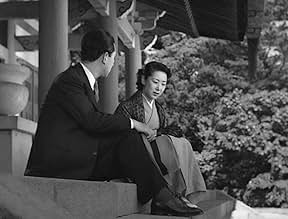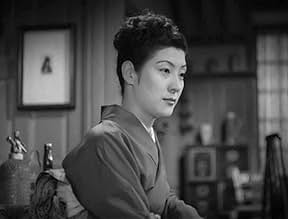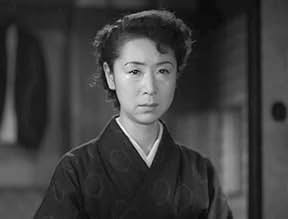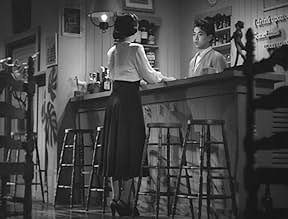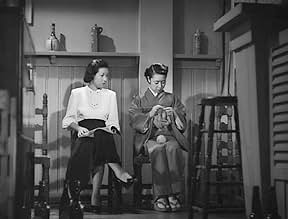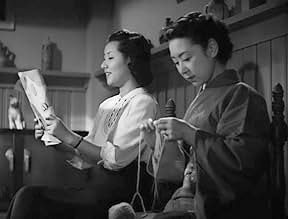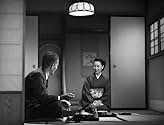PUNTUACIÓN EN IMDb
7,4/10
1,4 mil
TU PUNTUACIÓN
Setsuko vive un matrimonio infeliz con Mimura, un ingeniero alcohólico y desempleado. Su hermana Mariko intenta reunirla con Hiroshi, un antiguo amor que ha regresado de Francia, a pesar de ... Leer todoSetsuko vive un matrimonio infeliz con Mimura, un ingeniero alcohólico y desempleado. Su hermana Mariko intenta reunirla con Hiroshi, un antiguo amor que ha regresado de Francia, a pesar de que ella también lo ama.Setsuko vive un matrimonio infeliz con Mimura, un ingeniero alcohólico y desempleado. Su hermana Mariko intenta reunirla con Hiroshi, un antiguo amor que ha regresado de Francia, a pesar de que ella también lo ama.
- Dirección
- Guión
- Reparto principal
- Premios
- 2 premios en total
Reseñas destacadas
Master Yasujirô Ozu offers a light drama focused in two sisters the older Setsuko Munekata (Kinuyo Tanaka) an unhappy married woman with a lazy unemployed man that still love an old acquaintance Hiroshi Tashiro (Ken Uehara) a lonely man and a young one Mariko (Hideko Takamine) a sort of free-mind single girl, they have a gap of age around fifteen years old, therefore both represent the old-Japan lifestyle and the newest westernized Japan, Mariko enters to aid her suffering older sister trying push Setsuko toward the still single Hiroshi, all this upon a surveillance of their dying father.
As expected it was shot in contemplative manner, also highly romanticized mixing religious temple, confidential diary, father's illness, financial troubles, alcoholism and suppressed feelings as well, worthwhile to point out the magnificent performance of the sassy Hideko Takamine, furthermore Ozu displays the Setsuko's bitterness when your drunkard husband implies her a unfaithful wife, exposing a bad choice on marriage, nonetheless the sudden accident will change their fate, it's usually told in slow pace by the master-poet Yasujirô Ozu!!
Thanks for reading.
Resume:
First watch: 2025 / How many: 1 / Source: DVD / Rating: 8.25.
As expected it was shot in contemplative manner, also highly romanticized mixing religious temple, confidential diary, father's illness, financial troubles, alcoholism and suppressed feelings as well, worthwhile to point out the magnificent performance of the sassy Hideko Takamine, furthermore Ozu displays the Setsuko's bitterness when your drunkard husband implies her a unfaithful wife, exposing a bad choice on marriage, nonetheless the sudden accident will change their fate, it's usually told in slow pace by the master-poet Yasujirô Ozu!!
Thanks for reading.
Resume:
First watch: 2025 / How many: 1 / Source: DVD / Rating: 8.25.
From what I've heard, this is one of the least revered Ozu films, but after first glance I find it to be one of the most fascinating. A naive but zealous girl (Hideko Takamine) proposes marriage to a man who is in love with her sister (Kinuyo Tanaka) who is trapped in a loveless marriage; this is the girl's way of showing concern for her sister, by keeping the man she really loves but cannot have close at hand. It's an odd mix of high comedy and stark social commentary on the social boundaries that define women's roles, and for me it shows as much tonal range as anything I've seen in other Ozu films -- frivolous flirtatious interludes, sincere and tender romantic exchanges, and stark moments of violent rage are held in precarious balance thanks to Ozu's rock solid powers of observation. It's worth seeing this film as Ozu playing as self-consciously and inventively with genres as he did in the 30s -- the girl in some scenes narrates the action like a benshi. I definitely see this as a reworking of WHAT DID THE LADY FORGET?, revisiting the setup of the liberated meddling gamine overturning the fragile co-existence between a hapless housewife and the helpless husband; this time the scene of domestic violence is given the full measure of subtext and consequence that was lacking in the earlier film, adding resonance to what otherwise might be misjudged as straight melodrama. A difficult film to pin down, but no less alluring for it.
The Munekata Sisters is possibly the most obscure film in writer/director Yasujiro Ozu's postwar filmography. But it doesn't deserve to be, because it's actually a great comedy-drama that should have a wider audience.
The film revolves around the relationship between older sister Setsuko (Kinuyo Tanaka) and her younger sibling Mariko (Hideko Takamine). Setsuko is more reserved and adheres to traditional Japanese values, while Mariko embraces modern trends and enjoys sassing people. Naturally, their personality differences bring them into conflict.
Takamine gives a fantastic and genuinely funny performance as Mariko, which is light-years different from the reserved heroines played by Setsuko Hara in Ozu's more acclaimed films. She does funny voices, sticks out her tongue, and even dismissively flicks a suit of samurai armor. (I assume that's a big no-no in polite society.) Yet underneath all this joking is a sensitive character who loves her older sibling, despite their obvious personality clashes.
By contrast, it's initially easy to overlook Tanaka as Setsuko. But as the film goes on, Setsuko's struggle with a loveless marriage starts to dominate the plot, and her character becomes compelling.
Speaking of the plot, it contains more romantic melodrama and unexpected twists than usual for Ozu - possibly because it's based on a serialized story, rather than an original creation. But Ozu directs it with his usual sensitivity and prevents the material from becoming corny or saccharine. Ozu also makes effective use of his graceful transitional or "pillow" shots in this film, which are even more beautifully composed than usual.
Some viewers (understandably) dislike the film's unusual ending. I won't spoil it here, but suffice to say that I actually liked it, and indeed thought it was the most honest way to resolve the story. Ultimately, this film is about two sisters who are very different people but very committed to each other, and the ending does justice to their relationship and its place in the story.
I was a fan of Ozu for 20 years before I bothered to check this out - because, who ever talks about The Munekata Sisters? (Its lack of U. S. availability didn't help, but it's on the Criterion Channel now.) Imagine my surprise when I discovered that this is a witty, wise movie that rounds out Ozu's filmography quite nicely. It's not an all-time great like Late Spring, sure, but a movie doesn't need to be a legendary classic to be awesome.
The film revolves around the relationship between older sister Setsuko (Kinuyo Tanaka) and her younger sibling Mariko (Hideko Takamine). Setsuko is more reserved and adheres to traditional Japanese values, while Mariko embraces modern trends and enjoys sassing people. Naturally, their personality differences bring them into conflict.
Takamine gives a fantastic and genuinely funny performance as Mariko, which is light-years different from the reserved heroines played by Setsuko Hara in Ozu's more acclaimed films. She does funny voices, sticks out her tongue, and even dismissively flicks a suit of samurai armor. (I assume that's a big no-no in polite society.) Yet underneath all this joking is a sensitive character who loves her older sibling, despite their obvious personality clashes.
By contrast, it's initially easy to overlook Tanaka as Setsuko. But as the film goes on, Setsuko's struggle with a loveless marriage starts to dominate the plot, and her character becomes compelling.
Speaking of the plot, it contains more romantic melodrama and unexpected twists than usual for Ozu - possibly because it's based on a serialized story, rather than an original creation. But Ozu directs it with his usual sensitivity and prevents the material from becoming corny or saccharine. Ozu also makes effective use of his graceful transitional or "pillow" shots in this film, which are even more beautifully composed than usual.
Some viewers (understandably) dislike the film's unusual ending. I won't spoil it here, but suffice to say that I actually liked it, and indeed thought it was the most honest way to resolve the story. Ultimately, this film is about two sisters who are very different people but very committed to each other, and the ending does justice to their relationship and its place in the story.
I was a fan of Ozu for 20 years before I bothered to check this out - because, who ever talks about The Munekata Sisters? (Its lack of U. S. availability didn't help, but it's on the Criterion Channel now.) Imagine my surprise when I discovered that this is a witty, wise movie that rounds out Ozu's filmography quite nicely. It's not an all-time great like Late Spring, sure, but a movie doesn't need to be a legendary classic to be awesome.
It might be one of Ozu's least known films, and quite different from his other ones too, but his techniques and masterful skills are still there.
I've had the privilege to watch his films chronologically, from "The Only Son" to the last film he made, so I can notice that there was a big change from his (in that time) previous film "Late Spring" to his subsequent one "Munekata Sisters" and practically different from his other previous ones in general. Although the subject matter in this film is more romantic and dramatic in comparison to his previous films, as I just mentioned, his filmmaking style remains the same, the static camera and his beautiful close-ups are still there. Also another interesting thing to say is that this film resembles Mizoguchi's themes, he could have easily done this one of his films if he'd had the chance.
I might get the readers bored for repeating myself, but you can rest assured this is another essential film from Ozu you surely should get your hands on if possible.
Also this may be the last time I review one of Ozu's films, not because I don't like his other films, but because you simply can't go wrong with him, you either get his filmmaking or not. If you get it, then you'll probably love most of his films; therefore, you should really watch all you can get from him.
My score: 9.2/10
I've had the privilege to watch his films chronologically, from "The Only Son" to the last film he made, so I can notice that there was a big change from his (in that time) previous film "Late Spring" to his subsequent one "Munekata Sisters" and practically different from his other previous ones in general. Although the subject matter in this film is more romantic and dramatic in comparison to his previous films, as I just mentioned, his filmmaking style remains the same, the static camera and his beautiful close-ups are still there. Also another interesting thing to say is that this film resembles Mizoguchi's themes, he could have easily done this one of his films if he'd had the chance.
I might get the readers bored for repeating myself, but you can rest assured this is another essential film from Ozu you surely should get your hands on if possible.
Also this may be the last time I review one of Ozu's films, not because I don't like his other films, but because you simply can't go wrong with him, you either get his filmmaking or not. If you get it, then you'll probably love most of his films; therefore, you should really watch all you can get from him.
My score: 9.2/10
Ozu is always dancing on this line of melodrama, and he very typically rests on one side, the reserved and constrained side of things. However, with The Munekata Sisters steps fully on the other side of the line into full melodrama. I can imagine another form of this film more in line with Ozu's typical sensibilities that starts about 80% of the way through it as it currently is, and then spends 100-minutes to retell the current form's final 20 minutes. I think I might have liked that version better. That's not to dig too much on this film though. It's well-built melodrama. It's solid and mildly effective. It's just not up to Ozu's better standards.
The titular sisters are Setsuko (Kinuyo Tanaka), the elder, and Mariko (Hideko Takamine), the younger. Setsuko is married to Mimura (So Yamamura) who is unemployed and has been for a while at the same time that the bar that Setsuko owns is seeing an extended down period. The film actually begins with Setsuko rushing out of Tokyo to meet with her uncle, an oncologist, who has diagnosed the girls' father (Chishu Ryu) with cancer, not telling him about the diagnosis which was the practice in Japanese medicine at the time (think Ikiru).
Knowing Ozu's films, it's obvious where this film is going to go: the sisters dealing with the impending death of their father. And yet, that's not what happens. Instead, the focus turns to an old love of Setsuko's, Hiroshi (Ken Uehara), who has recently returned to France, divorced, and present as a contrast to Mimura's downtrodden status. It becomes a story about two sisters fighting over views of the world, centered around the question of what to do about Hiroshi and Mimura.
And what makes Ozu's take on this melodramatic material about a failing marriage and a potential affair, with the added spice of the younger sister getting mad at the older sister and trying to marry the old lover, is the specificity of character. Setsuko opens the film with her interactions with her oncologist uncle, worrying about the state of her father. Their father helps provide thematic context for what happens. Mariko is frustrated at Setsuko's situation and wants her to break free from Mimura to make herself happy, presenting this contrast between old ways and new ways that the girls have to navigate through.
It all provides this great grounding for the large swings in emotion that end up dominating the final act. No one is milking the giant cow in terms of overacting, but there's much more shouting and obvious tension at play here than Ozu has shown in a long time. I suspect no small part of this change in direction is the sudden move to Shintoho, the offshoot of Toho Studios in the late 40s that was designed to compete directly with Toho, though Ozu had been working for Shochiku since the silent era (he'd return to Shochiku with his next film). Another issue is that this is one of a very few number of films Ozu made based on someone else's work (the novel by Jiro Osaragi of the same name). He obviously felt some kind of desire to preserve as much of the original novel as possible, refusing to make it completely his own like someone like Kubrick might have done.
So, when we get to the ending that includes an unexpected death that allows for a reunion, it's so heavily melodramatic that it kind of feels...out of place. Ozu's approach to filmmaking makes it feel out of place in the film itself, and Ozu's body of work makes it feel out of place there. That's not to say it doesn't work. It works fine, but it does not have the subtle power of the smaller movements of Ozu's work in general.
Essentially, The Munekata Sisters works fine as a small melodrama, but it feels like some kind of compromised work. Ozu, working for a new studio trying to gets itself off the ground, adapting a book that doesn't quite match his sensibilities, does the best he can and comes out with a respectable result. It's never going to be rediscovered as one of his great films, but it's a fine little entertainment in its own right.
The titular sisters are Setsuko (Kinuyo Tanaka), the elder, and Mariko (Hideko Takamine), the younger. Setsuko is married to Mimura (So Yamamura) who is unemployed and has been for a while at the same time that the bar that Setsuko owns is seeing an extended down period. The film actually begins with Setsuko rushing out of Tokyo to meet with her uncle, an oncologist, who has diagnosed the girls' father (Chishu Ryu) with cancer, not telling him about the diagnosis which was the practice in Japanese medicine at the time (think Ikiru).
Knowing Ozu's films, it's obvious where this film is going to go: the sisters dealing with the impending death of their father. And yet, that's not what happens. Instead, the focus turns to an old love of Setsuko's, Hiroshi (Ken Uehara), who has recently returned to France, divorced, and present as a contrast to Mimura's downtrodden status. It becomes a story about two sisters fighting over views of the world, centered around the question of what to do about Hiroshi and Mimura.
And what makes Ozu's take on this melodramatic material about a failing marriage and a potential affair, with the added spice of the younger sister getting mad at the older sister and trying to marry the old lover, is the specificity of character. Setsuko opens the film with her interactions with her oncologist uncle, worrying about the state of her father. Their father helps provide thematic context for what happens. Mariko is frustrated at Setsuko's situation and wants her to break free from Mimura to make herself happy, presenting this contrast between old ways and new ways that the girls have to navigate through.
It all provides this great grounding for the large swings in emotion that end up dominating the final act. No one is milking the giant cow in terms of overacting, but there's much more shouting and obvious tension at play here than Ozu has shown in a long time. I suspect no small part of this change in direction is the sudden move to Shintoho, the offshoot of Toho Studios in the late 40s that was designed to compete directly with Toho, though Ozu had been working for Shochiku since the silent era (he'd return to Shochiku with his next film). Another issue is that this is one of a very few number of films Ozu made based on someone else's work (the novel by Jiro Osaragi of the same name). He obviously felt some kind of desire to preserve as much of the original novel as possible, refusing to make it completely his own like someone like Kubrick might have done.
So, when we get to the ending that includes an unexpected death that allows for a reunion, it's so heavily melodramatic that it kind of feels...out of place. Ozu's approach to filmmaking makes it feel out of place in the film itself, and Ozu's body of work makes it feel out of place there. That's not to say it doesn't work. It works fine, but it does not have the subtle power of the smaller movements of Ozu's work in general.
Essentially, The Munekata Sisters works fine as a small melodrama, but it feels like some kind of compromised work. Ozu, working for a new studio trying to gets itself off the ground, adapting a book that doesn't quite match his sensibilities, does the best he can and comes out with a respectable result. It's never going to be rediscovered as one of his great films, but it's a fine little entertainment in its own right.
¿Sabías que...?
- CuriosidadesThis was the first film made by star actress Kinuyo Tanaka after her triumphant months-long visit to the United States. Allegedly, Tanaka, from her recent contacts with Hollywood actors, was full of new ideas about acting, which she was not shy about sharing with her director, Ozu. The latter, who held his own very strong (and very un-Hollywood) ideas about acting, was reportedly not pleased by this, and relations between the two during filming were thus somewhat tense.
- ConexionesFeatured in El erizo (2009)
Selecciones populares
Inicia sesión para calificar y añadir a tu lista para recibir recomendaciones personalizadas
- How long is The Munekata Sisters?Con tecnología de Alexa
Detalles
Taquilla
- Recaudación en todo el mundo
- 332 US$
- Duración
- 1h 52min(112 min)
- Color
- Mezcla de sonido
- Relación de aspecto
- 1.37 : 1
Contribuir a esta página
Sugerir un cambio o añadir el contenido que falta

